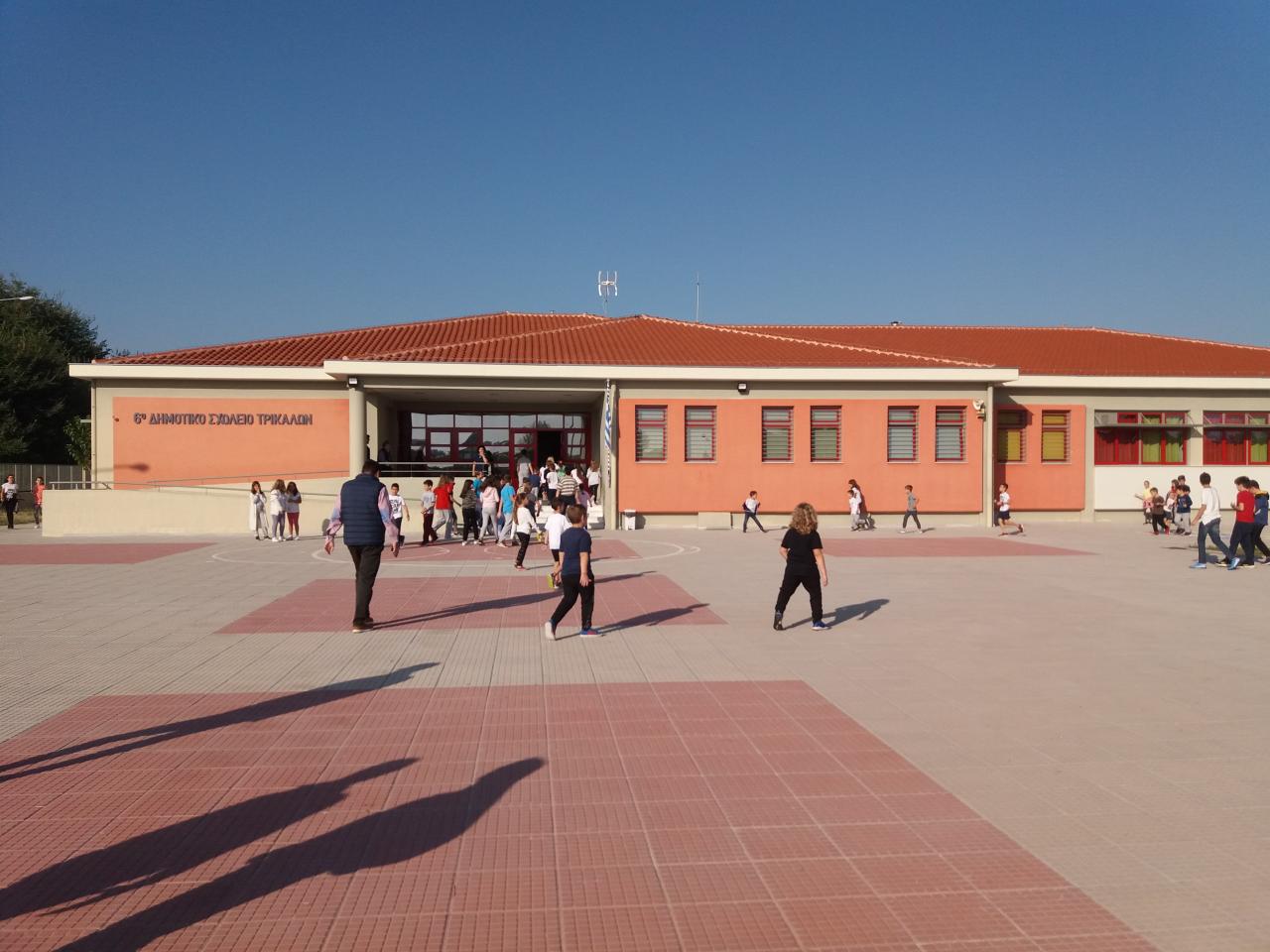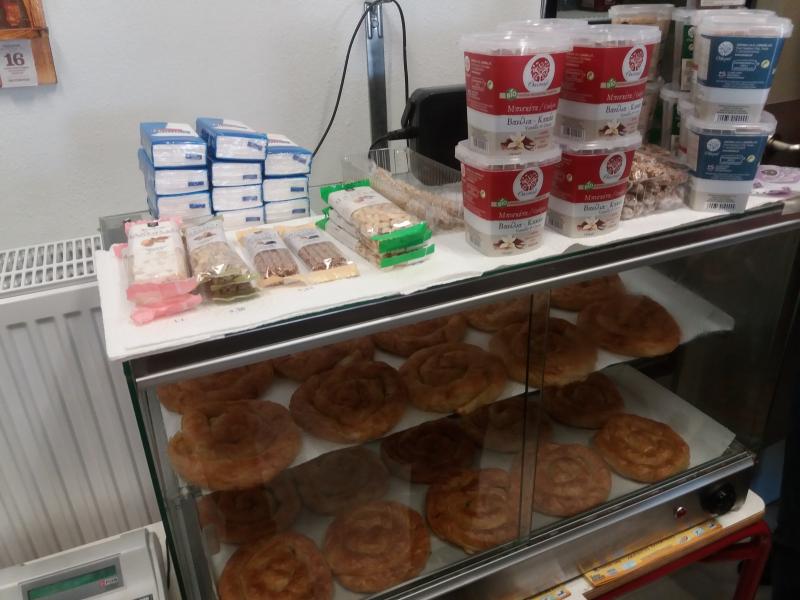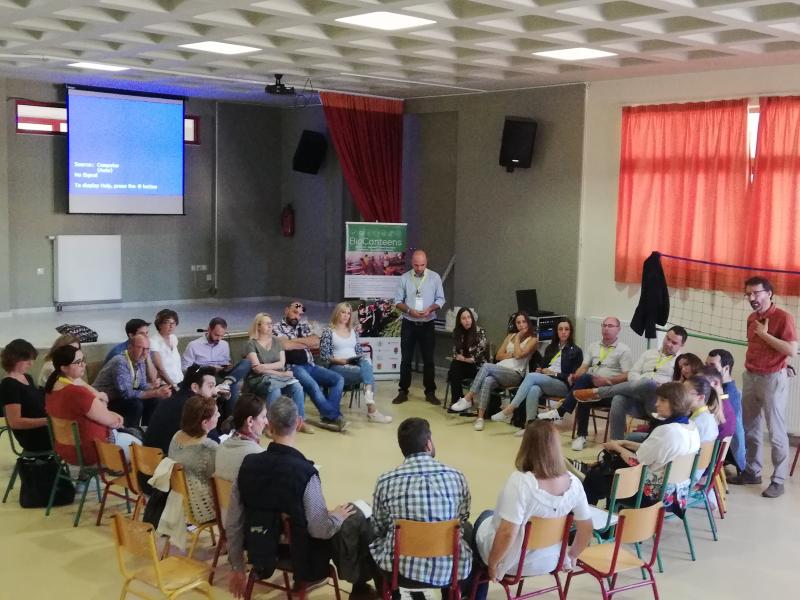
Students of the 6th Primary School of Trikala finally can come in contact with organic products, healthy nutrition and the circular economy as their school introduced BioCanteens good practice for sustainable food as a pilot action.
New products in the kiosks:
Now the school canteen supplies pupils with local and if possible organic products, also as part of the effort to get children to learn about the high quality chain of nutritional value and protect their health. Accordingly, 20 products are offered in total and range from fresh season fruits and juices without preservatives and added sugar, cereal bars, toasts etc., all whole grain. Similar specifications apply to sandwiches, cheeses, rice pudding, halva and more. Furthermore and as a future activity, a biogas plant is discussed be set up at the school, which will generate electricity for the needs of the school by burning food waste.

A strong commitment and approval from the local stakeholders:
For the implementation of the program, the Municipality of Trikala collaborates with the Parents’ and the Teachers' Association of the 6th Primary School, the Department of Dietetics and Nutrition of the University of Thessaly, the Directorate of Primary Education, E-Trikala Development Agency SA, the Chamber of Commerce of Trikala, local associations and businesses. During the school year, in-school experiential activities will also be conducted to help children understand more fully the importance of healthy eating and receive practical advice, such as: about how they could easily make a nutritious breakfast.
A couple of months since the initial operation, local producers, as well as students' parents, have warmly welcomed the initiative. "However, in our country, there are many products that are organic but not certified because of the lengthy bureaucracy. So through this program, we are mobilizing producers to step up their certification efforts and trying to simplify the process so that they can get involved. The greater the number of producers involved, the higher the competition will be between them and, consequently, the lower the prices of products in school canteens," Mr Anastasiou, Deputy Mayor of Trikala, explains.
Food habits evolution: the key factor for change:
Of course, transitioning students to healthier eating options is not an easy task, as the temptation of tasty, but harmful, food remains. The process takes time and effort. “For all of us, young and old, it is difficult to change a daily habit. However, we hope that, with proper education and information, children will become accustomed to eating healthy meals and eventually choosing them. The actual results of such actions are evident over a period of 8-10 years. "
The aim of this intervention is threefold: Adopt healthy eating habits from an early age, strengthen the local economy and efficiently manage food waste. "These are issues of major importance nowadays, as it has opened up a great debate about the need to protect our health through nutrition and the need to protect the environment through climate change." Now, in fact, since we have started from the 6th Primary School, the good example of other Trikala school units is set to follow. “We plan to gradually integrate all schools in the city into the BioCanteens good practice, within the next 5 years time”. Could the program be extended to school units in the rest of the country without any major obstacles? "It's not as difficult as it may seem. You just need guidance and know-how that we are willing to offer in order to be implemented in all schools of Greece and improve the nutritional habits of all children. Our country, after all, is extremely rich in agricultural products, but that has not been exploited."
A meeting to assess transfer progress:
All the above were illustrated in full details during the 6th Transnational Meeting, which took place in October in Trikala with the participation of partner cities, representatives of the Urbact Secretariat as well as representatives of the Urbact Local Group (ULG) and other stakeholders from the area. During the meeting an exhibition of all deliverables (Municipal farm platforms, Food Sovereignty Posters, Food Education & Kitchen MGPs, Timelines...) took place, during which each partner presented its local achievements/barriers/prospects and had the chance to reflect on their initial transfer plans in the light of this first year as they were asked to identify possible adjustments, changes in their plans for the year to come). In addition a “Food and Nutrition Hackathon” was organized by the Lead Expert, during which new and innovative ideas were created in relevance with the project’s theme and usage of ICT applications.

Contacts:
Vasilis Mitsios: billmitsios@yahoo.com
Harry Kalliaras: xkalliaras@e-trikala.gr

